After 9-Year Hiatus, Iranian Muslim Pilgrims Return to Saudi Arabia
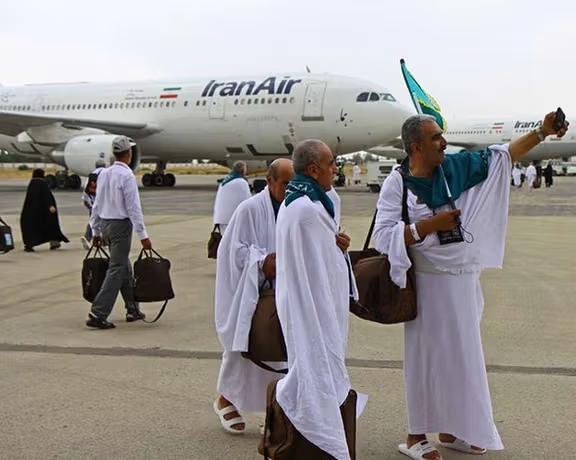
For the first time in nine years, Iran has resumed sending Muslim pilgrims to Saudi Arabia for Islamic pilgrimage to Mecca, after receiving approval from Riyadh.

For the first time in nine years, Iran has resumed sending Muslim pilgrims to Saudi Arabia for Islamic pilgrimage to Mecca, after receiving approval from Riyadh.
Two groups, each consisting of 85 people from Iran, began their journey to Saudi Arabia to perform what’s known as the Umrah.
The non-mandatory Islamic pilgrimage can be undertaken at any time of the year, unlike the Hajj which has specific dates according to the Islamic lunar calendar.
After years of diplomatic estrangement between Tehran and Riyadh, and an initial cancellation of the flights, the first departure was marked on Monday from Tehran’s main airport.
Representatives of Supreme Leader Ali Khamenei and Saudi Arabian Ambassador to Iran, Abdullah bin Saud Al-Anzi, were reportedly in attendance.
Nearly two years ago, with mediation from China, Tehran and Riyadh reached an agreement to reopen embassies and exchange ambassadors, thereby restoring diplomatic ties.
In 2016, Saudi Arabia severed ties with Iran after protesters stormed its embassy in Tehran. This occurred amid waves of protest against Riyadh's execution of a Shiite cleric.
Relations deteriorated further due to subsequent events, including missile and drone attacks on Saudi oil facilities and tankers in the Persian Gulf, carried out by Iran-backed Houthi militia in Yemen.
On Monday, Iran announced that it would operate two daily flights, each carrying 260 passengers, from various cities across the country.
The flights are set to continue until May 12 from different airports, with a total of 44 round trips scheduled, to fly 5,610 Iranian pilgrims to Saudi Arabia.
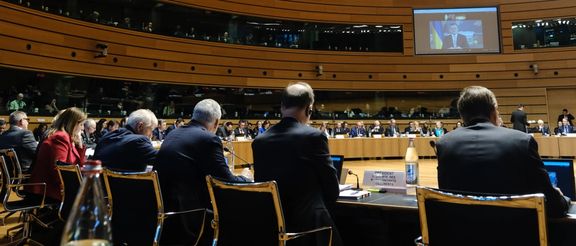
The European Union has reached an agreement to bolster sanctions against Iran in response to Tehran’s attack on Israel this month, following a meeting of the bloc's foreign ministers.
In a press briefing held in Luxembourg on Monday, EU foreign policy chief, Josep Borrell, said EU members had agreed for new sanctions to cover the production of missiles and enlarge the catalog of prohibited drone-related components.
The measures are expected to build upon existing sanctions imposed on Iran for its involvement in supplying drones to Russia for its invasion of Ukraine.
“The sanctions would also be expanded beyond Russia to cover drone and missile deliveries not only to Russia but also to proxies in the region," Borrell added.
Citing the use of Iranian missiles against Israel, Lithuanian Foreign Minister Gabrielius Landsbergis pointed to the need to restrict the transfer of missile components.
Lithuania, and a coalition of nine countries including Germany, France and the Netherlands, had previously called for an expansion of sanctions targeting Iran's drone and missile industry.
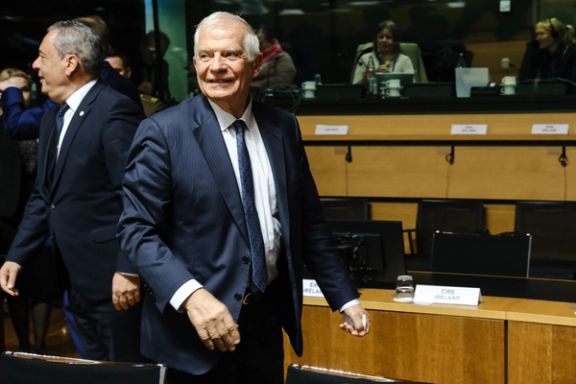
Israeli Foreign Minister Israel Katz welcomed the move, expressing his support for the sanctions on X. In the post, written in Persian, Katz underscored the significance of the EU's action in sending a clear message to the Iranian regime – tagging the country’s Supreme Leader Ali Khamenei.
Israel had also called on Western countries to list the state’s paramilitary force – the Islamic Revolutionary Guards (IRGC) – as a terrorist entity.
While the EU has sanctioned a number of individual IRGC members on human rights grounds following domestic acts of repression, it has not followed through with a designation arguing there are no legal grounds for it. This despite the European Parliament’s approval of a resolution calling on the bloc to consider the “terrorist” designation early last year.
Several foreign ministers voiced concerns about the stagnation of nuclear negotiations with Iran – although the issue was not on Monday's EU foreign ministers' agenda.
Landsbergis expressed skepticism about the viability of the Joint Comprehensive Plan of Action (JCPOA) - abandoned by the Trump administration in 2018, while his Austrian counterpart, Alexander Schallenberg, likened Iran's nuclear ambitions to a "black box," citing a lack of transparency and trust in international efforts to monitor its activities.
Sweden's Foreign Minister Tobias Billstrom, meanwhile, emphasized the importance of including Tehran’s proxies in the sanctions, recognizing their role in exacerbating regional tensions in the Middle East.
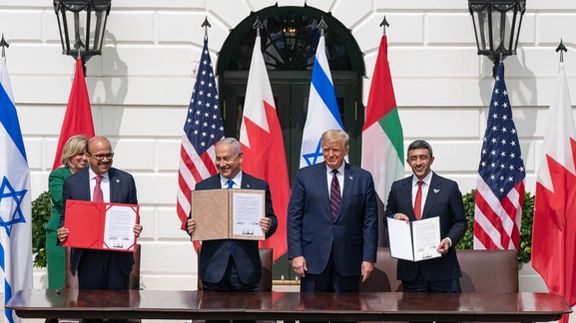
April 13, 2024, Iran’s attempted retaliation against Israel marks a watershed moment in the history of contemporary Middle East that might bring Arab monarchies and Israel ever closer than before.
Indeed, major Arab conservative monarchies seem to have entered an unwritten Entente with Israel against the Islamic Republic of Iran. Despite all their condemnations of Israel’s operation in Gaza and its tragic humanitarian consequences, the escalation of conflict between Israel and the Iranian regime may convince the major Arab monarchies in the Middle East that they would rather rise to stop the assault on Israel by Iran and its proxies than sit idly by. Instead of submitting to a balance of terror by Iran and its proxies, they may very well choose to strike a balance of containment and stability. Understandably, such an argument runs counter to a somewhat prevailing view of Hamas’ 7 October attack on Israel convinced must have stalled any normalization between the Arab monarchies in the region and Israel for a long time to come.
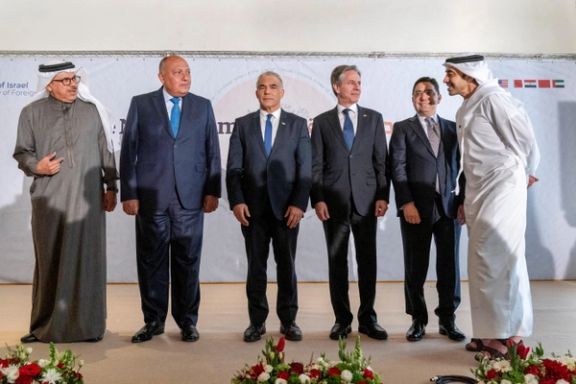
A tour d’horizon of the events of the past few years is thus in order. As Israeli Saudi negotiations seemed to have dragged on between 2022 and June 2023, a class of Abraham Accords skeptics began to emerge. Some argued that the accords had lost their luster and others found them to have become a dead end. In the wake of Hamas 7 October 2023 attack on Israel and Israel’s massive operation against Hamas in Gaza, the members of the same school of thought that had written off “the Abraham Accords” as practically a failure began enunciating the obituary of the short-lived rapprochement between these Arab States and Israel. Jordanian monarchy’s vehement condemnation of Israel as well as the nuanced condemnation of the Arab League indeed convinced many that the Hamas attack, orchestrated directly or indirectly by Iran and its proxies, had managed to nail the coffin of compromise and reconciliation. Many proponents of the same school of thought continued to voice their skepticism about the success of the ongoing US shuttle diplomacy between Arabia Saudi and Israel whose express purpose was to keep the normalization negotiations between the two countries alive despite the humanitarian tragedy in Gaza.
To be charitable to these pundits, Israel’s struggle to entrap Hamas’ top commanders is yet to yield success. Moreover, the negotiations between Israel and Hamas for the release of the remainder 133 Israeli hostages, through the mediation of Qatar and other Arab states in the region, have stalled for months.
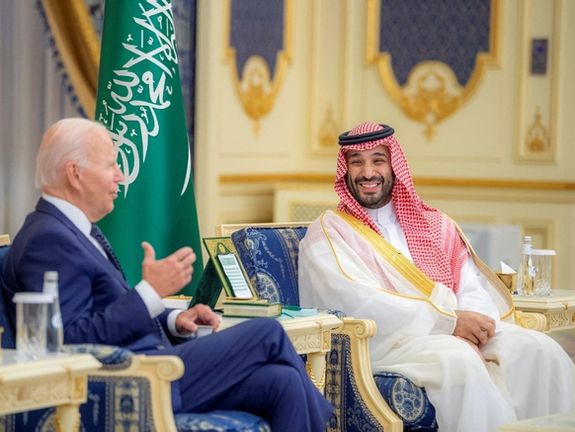
As most pundits were debating the worsening of relations between US president Biden and Israeli PM Bibi Netanyahu over Israel’s possible attack on Rafah in southern Gaza matters between Israel and the Iranian proxies came to a head. After a series of strikes against Iranian proxies’ top commanders in late March, Israel turned a definite corner in its conflict with these proxies as it allegedly levelled the consular annex of the Iranian regime’s embassy in Damascus on 1 April 2024 eliminating top Iranian Revolutionary Guards Corp commanders.
At this point, much commentary was dispensed by various pundits from left to the right of standard journalist spectrum speculating that Israel’s attack could further widen the gap between the Arab states and Israel. In fact, many of these pundits argued that Israel’s attack could bring the Arab countries to the Iranian regime’s side as they condemned the attack and urged the Iranian regime to exercise restraint.
Yet, on April 13, 2024, after signaling its intention to direct a retaliatory strike from the Iranian soil against Israel, the Iranian regime launched a rather long-winded mixture of kamikaze drones, cruise, and ballistic missiles towards Israel. In coordination with their patron, the Iranian allied regional proxies at once launched projectiles of all types towards Israel. Israel by the afternoon of the same day declared that over 99 percent of the devices had been intercepted and destroyed. Many of them had in fact been eliminated even before they reached the Israeli air space.
In addition to the US, France, and UK that engaged their air defences and air forces in defence of Israel, several Arab countries did at once engage their air defences against such projectiles as they were discovered to be using these countries’ air space. However, with the exception of Jordan, all these Arab countries have been silent about their true role in thwarting the swarm that Iran and its proxies unleashed towards Israel. Even the Jordanian King Abdullah cited the principle of “raison d’état” to justify his country’s intervention: “Jordan won't be an arena for a regional war”. Saudi Arabia’s silence about its possible action against the Yemeni projectiles that flew through its air space to reach Israel is all too conspicuous. It is highly likely that the Kingdom did engage its air defence to shoot down some of the Houthi’s projectiles. Despite such news, many of the Abraham Accords skeptics continue to insist that the Arab countries may distance themselves from US and Israel ever further to shield themselves from the vengeance of Iran and its proxies.
All in all, the Iranian “attempted retaliation” has provided a litmus test for the rigour of the Abraham Accords like no other. And irrespective of Biden’s administration attempts to de-escalate tensions with Iran and prevent an all-out regional war between Iran and Israel, the Arab monarchies that endured a bloody war with the Yemeni Houthis are justified to be wary of the Iranian drone and missile technology in the aftermath of its attempted retaliation against Israel. In a decade or so, memoirs or archival documents may reveal that Saudi Arabia, UAE and Bahrain indeed actively shot down many of the projectiles that were launched towards Israel by Iran and its proxies. Their silence as to their instrumentality in thwarting the Iranian attack is all too comprehensible. They do not wish to come across to the Arab Public Opinion as the defenders of the Israeli state that they have been collectively condemning for the commission of crimes against humanity in Gaza since October 2023.
As actions speak louder than words, the likelihood of the Arab states’ participation in thwarting the Iranian retaliation speaks volumes about which “entity” they perceive to pose the greatest threat to the peace and security of the region: Iran’s Shia imperium and its armed proxies. In the meantime, pundits who have hitherto written off both the Abrham Accords and the Saudi Israeli rapprochement may wish to reconsider their previous “analyses.” Confirmation bias is an odd beast in international relations that preys on those who constantly seek to adjust “facts” to “confirm” the constant relevance of frameworks that have long been rendered obsolete. Recent events establish that Israel and the Arab states of the Middle East are members of a security military Entente against Iran’s Shia Imperium for all intents and purposes. Whether or not this Entente will ever be formalized is just a matter of time.
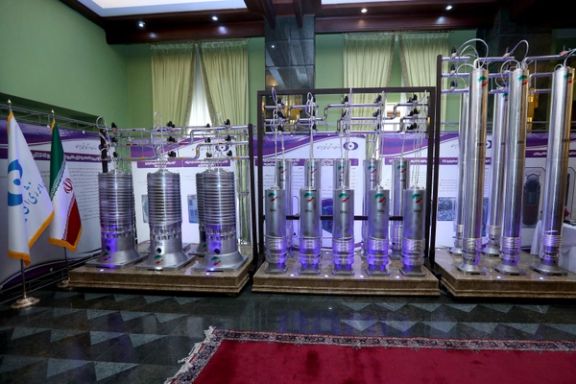
The Iranian foreign ministry claimed on Monday that nuclear weapons have no place in its nuclear doctrine.
The statement came in response to heightened tensions with Israel and recent remarks by a Revolutionary Guards commander that suggested potential changes to Iran's nuclear policy under external threats.
"Nuclear weapons have no place in our nuclear doctrine," said ministry spokesperson Nasser Kanaani during a press briefing in Tehran. He once again claimed that Iran's nuclear program is “strictly for peaceful purposes,” a position consistently maintained by Tehran despite international scrutiny.
Ahmad Haghtalab, a Revolutionary Guards commander, last week indicated that Israeli threats could compel Iran to "review its nuclear doctrine and deviate from its previous considerations."
Iran's Supreme Leader, Ayatollah Ali Khamenei, had previously issued a fatwa banning the development of nuclear weapons.
However, nuclear experts are almost unanimous in their assessment that enrichment to the levels and in the amounts that Iran has been doing since 2021 cannot be justified in the absence of a weapons program.
Despite Kanaani's reassurance of peaceful intentions, he addressed recent regional escalations, particularly the Iranian missile and drone attack on Israel earlier this month, which Tehran says was a retaliatory act for the attack on its consulate in Damascus.
He described a subsequent Friday attack on Isfahan, attributed to Israel, as a "provocative act" and warned, "We will respond decisively and more strongly to any aggressive action from any source."
The incident at Isfahan has further strained relations, with reports from The New York Times indicating significant damage to a defense radar near Natanz, Iran’s principal nuclear site, after the attack on 8th Shekari Air Base.
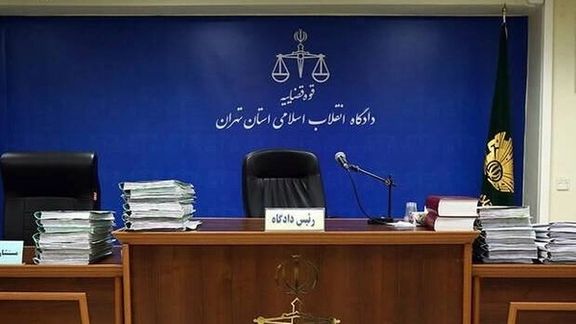
Iran’s Judiciary has mandated provincial justice departments to cease registering legal complaints against state officials, a move widely seen as a way to further shield government and military officials from facing accountability.
The latest directive instructs that instead of allowing individuals to file legal complaints directly, they are now told to go to the administrative offices or public relations departments of the relevant government organization.
While the Iranian judiciary lacks independence, individuals file legal complaints, akin to those in the West, before initiating lawsuits to assert their rights.
Prominent journalist and political analyst Abbas Abdi criticized the directive, saying the move is not lawful.
“This resolution is not legal because neither 'government officials and state leaders' have been defined, nor has any legal article been mentioned. These are futile patches sewn onto regulations to block the paths of protest," Abdi said.
In Iran, numerous high-ranking officials and military organizations – including members of the Islamic Revolutionary Guards (IRGC) – possess legal immunity, shielding them from prosecution.
In one prominent case, when the IRGC shot down Ukraine International Airlines Flight PS752, resulting in the deaths of all 176 people onboard – families were told by the Tehran Military Prosecutor’s Office that several government and military organizations and several high-ranking officials cannot be legally prosecuted.
Critics have long argued that it is one more indication of the regime’s culture of impunity – where corruption, abuse of power, and human rights violations by officials are not confronted with legal consequences.

Over a dozen Iranian Baha'i women were summoned to the Islamic Revolutionary Court, over arbitrary charges of propaganda against the Islamic Republic and participating in activities contrary to Islamic law.
The 15 women, who reside in Baharestan, in the central province of Isfahan, were specifically accused by the Prosecutor’s Office for "propaganda against the Islamic Republic system" and "participation in promotional and educational activities contrary to the sacred Sharia of Islam."
According to US-based NGO, Human Rights Activists News Agency (HRANA), Iranian security agents searched the homes of some of the women.
The women were summoned for their first court appearance on May 1.
The regime in Iran has long persecuted the Baha'i community in Iran, denying them the freedom to worship.
Some of the women were reportedly targeted by the judiciary in 2021, when they were arrested and subsequently released on bail.
The event, HRANA said, illustrates the constant and systematic violation of Bahai religious freedoms by comparison with norms maintained by international human rights.
There are over 300,000 Baha'is living in Iran, making them the largest non-Muslim religious minority, systematically targeted since the 1979 revolution.
The current constitution only recognizes four religions: Islam, Christianity, Judaism, and Zoroastrianism.